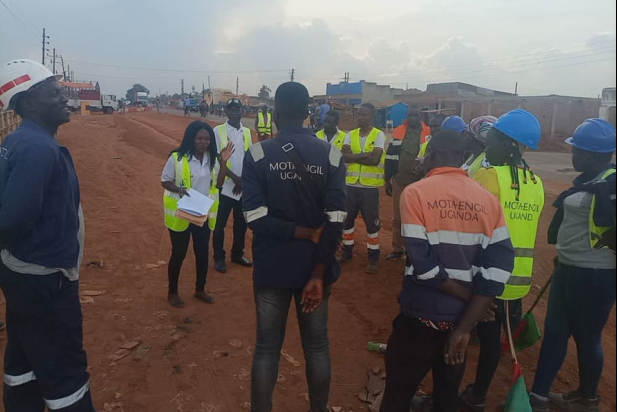Tororo-Kamdini road construction: Govt struggles to protect locals from sexual exploitation

A staff of Joy for Children Uganda, an NGO, sensitises Mota-Engil's workers about code and coduct in February 2023. PHOTO/BILL OKETCH
What you need to know:
- The government has hired a non-profit organisation to sensitise the public against sexual abuse.
By BILL OKETCH
The government has set up environment and social safeguards requirements for the Tororo-Kamdini road project to check sexual abuse on the road.
The 340km road is under the North Eastern Road Corridor Asset Management Project (NERAMP).
For the NERAMP Lango cluster (Dokolo-Kamdini), the government has hired Joy For Children Uganda (JFCU), a non-profit children’s rights organisation, to help mitigate social risks associated with violence against children and gender-based violence due to road works.
The JFCU team based at the Lira field office, Lira City, is working with local leaders, right from village level to the district and the Uganda National Roads Authority (Unra) to make sure the public, especially women and children, are protected from sexual exploitation and abuse.
While introducing JFCU to the Kole District leadership on February 13, 2020, Unra’s social development specialist, Mr Stephen Obore, said: “The organisation brings the needed expertise in managing social risks.”
He added that the government intends to build a good road for the community.
“We want to uphold the integrity of the community because many times whenever a big infrastructure project comes, it comes with negative consequences, especially associated with labour influx,” Mr Obore said.
He added: “These can be social or environmental in nature and we are mindful of that. That is why we have hired consultants specifically to address those social concerns.”
The executive director of JFCU, Mr Moses Ntenga, said the organisation would mitigate incidents of violence against children and gender-based violence due to the project.
“Our core mandate as an organisation is to ensure that children of Uganda grow up with dignity and they’re able to live or grow and maximise their full potential,” he said.
Mr Ntenga added: “We shall make sure children are taken care of, their rights are observed, their needs are met and then they are able to grow up and be responsible citizens in future.”
The Kole District vice chairperson, Mr Alfonse Aracha, appealed to all stakeholders to sensitise the project-affected communities and prepare them to handle the pressure that might come with it.
“We have now broken the ground for actual campaigns as we wait for the actual roadworks,” he said.
He added: “I would like to pledge total support on behalf of the district leadership that our doors are very open… we are very ready to work diligently together with you so that this project succeeds and at the end of the day our community would also have benefited.”
Ms Diana Ankunda, JFCU’s project coordinator in charge of NERAMP Lango Cluster, said they have been carrying out sensitisation of communities, schools and road construction workers.
However, she said whenever they have an activity in schools, teachers always shun it yet parents accuse them of abusing learners either sexually, emotionally or psychologically.
In an interview with this newspaper on Monday, Ms Ankunda said road workers also complain that members of the community are always hostile to them.
“Flag raisers say they are not being respected by the road users. The road workers say whenever they ask road users to slow down, they always abuse them and speed off,” she said.
People who are said to be making life hard for road workers include those driving government cars, boda boda riders and bus drivers plying the Lira-Kamdini road.
About the project
The construction works for the project are being undertaken by Mota-Engil Africa, a Portuguese firm. The 340km stretch covers Tororo-Mbale-Soroti-Dokolo-Lira-Kamdini road.
The project, which is funded by the World Bank to a tune of €138 million (Shs549.5 billion) operates on the principle of output and performance-based road contracts (OPRC), according to Unra.
The contract, which commenced effectively in August 2018, has three components: engineering (works), project management and monitoring, and social risks management.
The overall construction was supposed to last 36 months but suffered several delays. After the construction is done, Mota-Engil Africa (contractor) is supposed to maintain it for another five and half years before handing it over to the government.




